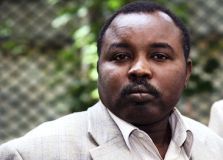More violence can erupt if peacekeepers fail – Darfur’s exiled rebel chief
April 22, 2008 (PARIS) — Darfur’s main rebel chief denied Tuesday that the United Nations has achieved any breakthrough in brokering peace talks for the war torn Sudanese region, and warned that more violence could erupt if the new U.N. and African Union peacekeeping mission to Darfur fails.

“Wrong negotiations will only complicate the matter and prolong the suffering of the people of Darfur,” al-Nur said in an Associated Press interview in Paris, where he lives in exile.
Restoring security in Darfur is the role of the U.N. and AU peacekeeping force that launched in January, he said. But the mission so far only has about 9,000 troops and police on the ground out of the 26,000 that have been authorized.
Western officials have blamed the Sudanese government for delaying the provision of troops and key military equipment. Khartoum denies the accusations but has vetoed troop contributions from some non-African or non-Muslim nations, a position Al-Nur calls “racist.”
“Contributors have to come from the whole world. It’s the only guarantee that the force works on the ground, with neutrality,” he said.
The U.N. and AU have tried for months to open new peace talks between the Sudanese government and rebel groups following the failure of a 2005 agreement to stem violence in Darfur. But most rebel chiefs are boycotting the negotiations, and security in Darfur has further deteriorated in recent months.
U.N. and AU peace mediators said last week they had undertaken an intense round of talks with the Sudanese government and rebel factions, and that all sides were willing to resume discussions.
But al-Nur said that his faction has already signed five peace agreements with the Sudanese government that were repeatedly violated.
“The international community shouldn’t be trying to add yet another agreement to the waiting list that the government still has to implement,” al-Nur said.
Al-Nur said he shared his views last month with delegates from the five permanent members of the Security Council and U.N.-AU mediators during a closed-door meeting at the French Embassy in Geneva.
“It was very positive to be able to meet face to face with the big five (countries),” al-Nur said, referring to Britain, China, France, Russia and the U.S.
He said “there was some intense discussions,” with Chinese special envoy Liu Guijin, whose country is viewed as Sudan’s main backer.
The French Foreign Ministry has confirmed it organized the meeting with al-Nur, an indication of how important Darfur’s rebel chiefs are in brokering peace in the war-torn region.
Darfur rebels have fractured into multiple groups. Al-Nur doesn’t head the strongest armed faction, but he is viewed as enjoying large support among refugees. His refusal to sign the 2005 peace agreement is viewed as one key reason why it failed.
More than 200,000 people have died and 2.5 million have been chased from their homes in Darfur since fighting broke out in 2003 when the SLM and other ethnic African rebels took up arms against the Arab-dominated Sudanese government, accusing it of discrimination.
Like U.S. President George W. Bush, al-Nur describes violence in Darfur as a government-sponsored “genocide” of ethnic Africans. The government denies the claim, as well as widespread accusations that it backs Arab militia know as the Janjaweed blamed for the bulk of the killing.
Elnur says he will agree to peace negotiations when the U.N. and AU peacekeeping force proves it can stop “the continued killing of civilians,” disarm Janjaweed militias and drive out Arab settlers who are occupying the land of Darfur refugees.
He warned that the U.N. peacekeepers do not have much time to prove they can stem the violence in Darfur because civilians are increasingly frustrated with years of insecurity. He also said the SLM could call on refugees to “protect themselves” if it loses hope that international powers “are serious about ending the suffering.”
He would not specify what measures he would then call for, but warned that: “I’m very afraid that if people lose all hope, they’ll fight like devils.”
(AP)
